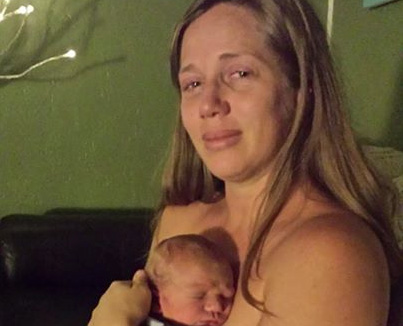The demands of pregnancy, childbirth and what comes next can hit new mothers and fathers hard and completely by surprise. In early September this year a photo of a mother with her newborn went viral with over 20,000 facebook shares. The story has trended across social media and news feeds generating a powerful debate about the realities of becoming a mother.
In the picture Danielle Haines cradles her baby, Ocean, into her chest with tears in her eyes – the image portrayed the emotional and physical rollercoaster of motherhood and resonated with mothers across the globe.
“It was just real, it was honest,” Haines told KPHO.
The picture was taken when Danielle Haines was three days post-partum and she comments:
“I was so raw and so open, I was a f***ing mess. I loved my baby, I missed his daddy (he went back to work that day), I was mad at my mom, my heart hurt for my brother because my mom left us and now I had a little boy that looked like him, my nipples were cracked and
bleeding, my milk was almost in, my baby was getting really hungry, I was feeling sad that people kill babies, like on purpose, I had not slept since I went into labor, I didn’t know how to put my boobs away, my vagina was sore from sitting on it while nursing constantly, I was kinda loosing my mind.”
Danielle first published the picture in a private Facebook group, whilst training as a midwife and it quickly went viral and grew to over 20,000 Facebook shares.
The comments posted in response captured each woman’s experience of motherhood. “Kind of the overwhelming response was, thank you for sharing this, I felt very similar or I felt the same,” Haines told KPHO. “I never felt like I had someone to talk to, I felt very alone, so I think it resonates for a lot of people because we’ve probably all been there.”
The notion exists of a picture-perfect world with a happy mother cradling her blissfully happy baby with father beaming by her side. This is the airbrushed version of parenthood. The rise of social media and marketing have amplified this message and now more than ever parents feel the pressure to be perfect and only share the ‘good’ bits of their own journey.
Society can appear to have bought into this misconception leaving parents feeling they are doing something wrong if their experience is any different. The actual reality of parenthood is often avoided, or not fully recognised, which can leave mothers and fathers feeling misunderstood, isolated, overwhelmed or even a failure.
The bravery and honesty of Danielle removed some of the stigma and opened up the possibility for us to acknowledge that perinatal mental health and wellbeing (defined as from conception to one year old baby) is a serious issue.
Postnatal depression is now recognised as a global problem affecting up to 20% of women and the incidence continues to rise (Oates, M, 2000, Gavin et al., 2005). In Australia more than one in seven new mothers and up to one in ten new fathers experience PND each year (Deloitte, 2012, Paulson & Bazemore, 2010).
It is important to redefine our discussion around what constitutes ‘a perinatal mental health problem’ as most mothers and fathers may feel they do not experience anything as severe as Postnatal Depression (PND). Added to this is the misconception that there has to be a complete mental breakdown for professional help to be needed.
Yet symptoms of anxiety or depression are very common, during the perinatal period, affecting up to 20% of women. This is understandable given the complex range of physical, hormonal and emotional demands a mother has to cope with whilst caring for her baby.
In my experience mothers and fathers can deny their more troubling feelings as they believe they should be experiencing the perfect world society has portrayed. This can affect their ability to relate to their baby and partner.
As part of your own mental health check-up you could think about the past two weeks and ask yourself have you felt bothered by:
- Feeling down, depressed or hopeless?
- Having little interest or pleasure in doing things?
- Feeling nervous, anxious, or on edge?
- Not being able to stop or control worrying?
If you answered yes to any of these questions and they have occurred on several days or more you could benefit from talking about your feelings with a mental health professional.
There is evidence women do want to discuss their perinatal mental health problems with studies reporting that women prefer psychotherapy, a talking therapy treatment over taking anti-depressants (Dennis and Chung-Lee, 2006).
It is vitally important that we continue to raise awareness of the reality of parenthood rather than espousing the stereotyped picture-perfect image. Opening up this debate in our wider culture and society will encourage women and men to express the very common troubling, or overwhelming, feelings that can come at this time. This will enable parents to access the support and help they need at this crucial life stage – benefiting themselves as well as their children and partners. Take the first step by sharing your own experience or by reaching out for help.
Sources
References
Deloitte Access Economics. (2012) The cost of perinatal depression in
Australia. Report. Post and Antenatal Depression Association
Dennis, C.L. and Chung-Lee, L. (2006) Postpartum depression help-seeking barriers and maternal treatment preferences: a qualitative systematic review. Birth. 33: 323–331
Gavin, N.I., Gaynes, B.N., Lohr, K.N., Meltzer-Brody, S., Gartlehner, G., and Swinson, T. (2005) Perinatal depression: a systematic review of prevalence and incidence. Obstet. Gynecol. 106: 1071–1083
Oates, M (2000) Perinatal Maternal Mental Health Services Council Report CR88. Royal College of Psychiatrists
Paulson, J. F. & Bazemore, S. D. (2010). Prenatal and postpartum depression in fathers and its association with maternal depression: A meta-analysis. JAMA, 303(19), 1961-1969. (doi:10.1001/jama.2010.605)

